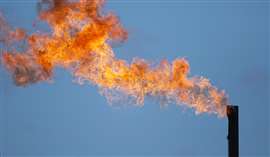Read this article in 中文 Français Deutsch Italiano Português Español
Biden Administration launches methane task force
July 27, 2023
Aimed at reducing emissions, particularly from oil and gas sector
 The White House said it’s creating a new, Cabinet-level task force on methane to help curb the potent greenhouse gas. (Image: NASA)
The White House said it’s creating a new, Cabinet-level task force on methane to help curb the potent greenhouse gas. (Image: NASA)
The Biden Administration has formed a new Cabinet-level Methane Task Force, which it said will advance a whole-of-government approach to proactive methane leak detection and data transparency, and support state and local efforts to mitigate and enforce methane emissions regulations.
The task force was announced at the first-ever White House Methane Summit, which focued on the need to “dramatically reduce” methane emissions, especially from leaks in the oil and gas sector.
Methane, a powerful greenhouse gas, is 80 times more potent than carbon dioxide and can lead to serious public health impacts, from asthma to cancer to premature deaths.
“Methane is responsible for one-third of the warming impacts millions of Americans are experiencing right now – from record heat waves to smoke-filled skies to flash flooding and more intense hurricanes,” according to a news release from the White House. “Methane leaks amount to billions of dollars’ of wasted natural gas every year. In the United States, 30% of methane emissions come from the oil and gas sector, which increasingly has tools to slash leaks.”
Among methane mitigation proposals:
- Plugging orphaned wells on Federal, state, and private lands To date, the Department of Interior has made $1.3 billion of this funding available to plug, remediate, and reclaim orphaned wells on Federal, Tribal, state, and private lands, and has awarded nearly $660 million in grants under the program. This has enabled roughly 3,000 orphaned wells to be plugged, with thousands more expected through already-announced funding.
- Improving leak detection and repair to prevent emissions events before they start: Last year PHMSA inspected all federally regulated pipelines, liquefied natural gas, and underground natural gas storage facility operators—the first time every operator has been inspected in a calendar year—to ensure compliance with statutorily mandated methane emissions reduction requirements. In April 2023, PHMSA awarded 37 entities nearly $196 million of Bipartisan Infrastructure Law grant funds to repair, replace, or rehabilitate nearly 270 miles of leak-prone natural gas pipe, reducing methane emissions by an estimated 212 metric tons, annually, and significantly reducing safety risks. These projects are projected to create hundreds of jobs in rural and urban communities.
- Updating decades-old federal leak detection and repair standards. In May 2023, PHMSA proposed a rule that directly addresses methane leaks and intentional venting on more than 2.7 million miles of gas transmission, distribution, and gathering pipelines; 400+ underground natural gas storage facilities; and 165 liquefied natural gas facilities. Additionally, PHMSA is in the process of enhancing safety requirements for gas distribution pipelines, through a rulemaking that will implement the Leonel Rondon Pipeline Safety Act that Congress enacted as part of the bipartisan Protecting our Infrastructure of Pipelines and Enhancing Safety (PIPES) Act of 2020. The proposed rule is currently under interagency review and targeted for release in August.
MAGAZINE
NEWSLETTER

CONNECT WITH THE TEAM









